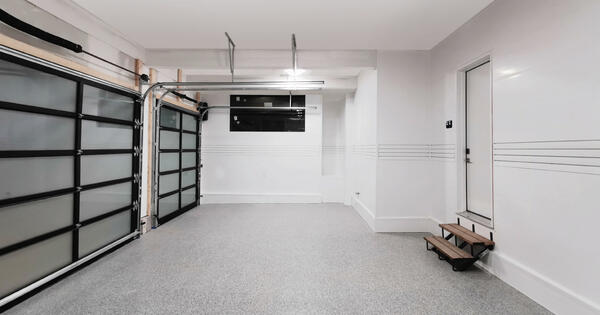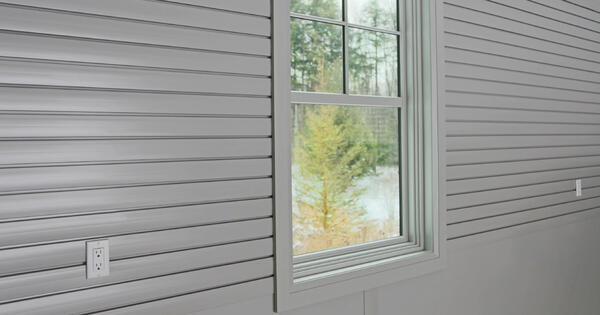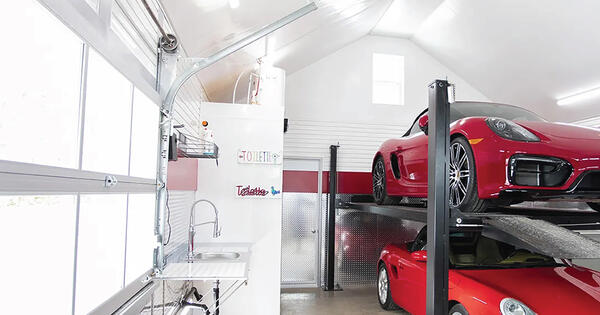This post was originally published in October 2024. Last updated: October 2025.
Drywalling your garage is one of those upgrades that can make a big difference in both functionality and aesthetics. It transforms what might be an unfinished space into a more polished, livable area — perfect for storage, hobbies, or even as an extension of your home.
However, before diving into a drywall project, it's crucial to understand the costs involved. Drywall installation cost isn’t just about buying sheets of drywall. It’s about considering labor, materials, and any additional features like insulation or painting. Knowing what to expect in terms of cost can help you plan your budget, avoid surprises, and make informed decisions about the scope of your project.
How Much Does It Cost to Drywall a Garage?
The cost to drywall a garage can vary widely depending on several factors, but most homeowners can expect to spend anywhere between $1.50 to $3.50 per square foot for materials and labor combined. If you're tackling a single-car garage, you can expect the total cost to land somewhere between $360 and $840. For a two-car garage, the cost rises to $660 to $1,540. And if you have a larger three-car garage, you could be looking at $930 to $2,170 to drywall the entire space.
These estimates reflect typical drywall installation costs and include both labor and materials. Upgrades such as moisture-resistant or fire-rated drywall can increase the total price.
What Factors Determine Drywall Installation Cost?
Several key factors can influence the total cost of drywalling your garage:
- Garage Size: Naturally, the bigger the garage, the more materials and labor are required. This can have a significant impact on your budget.
- Type of Drywall: Standard drywall is the most affordable option, but if you need moisture-resistant or fire-rated drywall — common for garages that connect directly to the home — those costs can go up. Specialty drywall materials can cost more than double the price of standard sheets.
- Labor Costs: The labor cost to install drywall is often the largest portion of the overall cost. Rates vary by region, and in some areas, you’ll pay a premium for experienced drywall installers.
- Regional Pricing Differences: The cost of drywall installation can differ depending on where you live. Urban areas tend to have higher labor costs compared to rural regions, and materials can also be priced differently based on local supply and demand.
- Additional Materials: Insulation, mudding, taping, and finishing all add to the final bill. If your garage needs to be insulated, that will add to the labor and material costs. Paint and primer are other finishing costs to factor in.
Long-term maintenance and repairs also affect the overall cost. Drywall can crack, dent, or suffer water damage over time — issues that are common in garages exposed to moisture and temperature swings.

How Do Drywall Material Costs Break Down?
To help you wrap your head around the total cost, we’ll break down the materials needed to drywall a single-car garage measuring 12’x20’x10’ with an 8’x7’ garage door.
- Drywall for Walls: The total perimeter of the garage is (2 × 12') + (2 × 20') = 64 feet. With walls that are 10 feet tall, the total wall area is 64 × 10 = 640 square feet. The garage door takes up 8 × 7 = 56 square feet, leaving 640 − 56 = 584 square feet of wall to cover. Since each 4’x10’ drywall sheet covers 40 square feet, you will need 584 ÷ 40 = 14.6, rounded up to 15 sheets.
- Drywall for Ceiling: The ceiling area is calculated by multiplying the length and width of the garage, which is 12 × 20 = 240 square feet. Each 4’x8’ sheet covers 32 square feet, so 240 ÷ 32 = 7.5, rounded up to 8 sheets of drywall for the ceiling.
- Drywall Tape: One 500-foot roll of drywall tape typically covers about 1,000 square feet. The combined area of the walls and ceiling is 584 + 240 = 824 square feet, so one roll of tape will be sufficient for this project.
- Paper Face Cornerbead: There are four outside corners in the garage, each 10 feet tall, for a total of 40 linear feet. Since each piece of cornerbead is 8 feet long, you will need 40 ÷ 8 = 5 pieces to cover all corners.
- Drywall Compound: A 12-liter pail of all-purpose drywall compound typically covers 450–500 square feet. With 824 square feet of wall and ceiling, you will need 824 ÷ 450 ≈ 1.83, rounded up to 2 pails to complete the project.
- Drywall Screws: Each 4x10 sheet requires about 40 screws, and each 4x8 sheet requires 32 screws. For the walls, 15 sheets × 40 screws = 600 screws, and for the ceiling, 8 sheets × 32 screws = 256 screws. This gives a total of 600 + 256 = 856 screws. With 500 screws per bucket, you will need two buckets to ensure you have enough.
- Paint & Primer: Each 3.79L can of paint and primer typically covers 350–400 square feet. With 824 square feet to cover, you will need 824 ÷ 400 = 2.06, rounded up to 3 cans for full coverage.
Based on pricing listed for similar products available at Home Depot, here’s what you can expect to spend, including an additional conversion to U.S. dollars based on the current exchange rate (1 CAD = 0.72 USD):
| Product | Size | Quantity | Unit Cost (CAD) | Total Cost (CAD) | Total Cost (USD) |
|---|---|---|---|---|---|
| Drywall for Walls | 4' x 10' | 15 | $21.78 |
$326.70 |
$234.20 |
| Drywall for Ceiling | 4' x 8' | 8 | $17.42 | $139.36 | $99.90 |
| Drywall Tape | 500 Linear Feet | 1 | $9.84 | $9.84 | $7.05 |
| Paper Face Cornerbead | 3/8" x 3/8" x 8' | 5 | $6.40 | $32.00 | $22.94 |
| All Purpose Compound | 12 Liter Pail | 2 | $37.78 | $75.56 | $54.17 |
| Drywall Screws | 500 Pieces | 2 | $13.98 | $27.96 | $20.04 |
| Paint & Primer | 3.79 Liters | 3 | $45.97 | $137.91 | $98.86 |
Total Costs |
$749.33 |
$537.17 |
While we’ve used standard drywall in the example above, upgrading to moisture-resistant or fire-resistant drywall can significantly raise the total price of your project:
- Moisture-Resistant Drywall: If you live in an area with high humidity or use the garage for activities that introduce moisture (like a laundry area), moisture-resistant drywall is an upgrade worth considering. It typically costs $1.50 to $2 more per square foot than standard drywall, which could add $150 to $250 to your total project.
- Fire-Resistant Drywall: For garages attached to homes, fire-resistant drywall is another option. It’s thicker and helps slow the spread of fire. Fire-rated drywall typically costs $2 to $3 more per sheet, adding $300 to $450 to the overall cost depending on the garage size.
What is the Labor Cost of Drywall Installation?
When hiring professionals to install drywall, labor can often be one of the biggest expenses. Typically, you can expect to pay around $2.60 per square foot for drywall installation. This includes hanging the drywall, mudding, taping, and sanding the seams. Additionally, if you plan to have the drywall painted, it will cost another $2.60 per square foot for the painting process.
Let’s break down the labor costs for a garage with 824 square feet of surface area (584 square feet of walls and 240 square feet of ceiling):
- Drywall Installation: At $2.60 per square foot, for 824 square feet, the labor cost for installing the drywall is $2,142.40 (824 sq. ft. x $2.60).
- Painting: Similarly, for the painting labor, you’d pay another $2,142.40 (824 sq. ft. x $2.60).
So, for both drywall installation and painting, the total labor cost would be $4,284.80 in addition to the $749.33 you paid for the material.
Hiring professionals to drywall and paint your garage is a significant investment, with labor costs accounting for a large portion of the project. While DIY might save some money, hiring experts ensures the job is done efficiently and with professional results.
Is Trusscore More Cost-Effective Than Drywall?
When comparing drywall installation cost with Trusscore Wall&CeilingBoard, the upfront material cost for Trusscore is higher, but the long-term benefits often outweigh the initial investment. Trusscore panels are pre-finished, water-resistant, and highly durable, eliminating the need for painting, mudding, or repairs.
Now, let’s break down the material costs for a garage measuring 12’x20’x10’ that includes an 8’x7’ garage door using Trusscore Wall&CeilingBoard using an output from the Trusscore Cost & Material Estimator:
| Product | Quantity | Unit Cost | Total Cost |
|---|---|---|---|
| 10' White Trusscore Wall&CeilingBoard | 42 | $43.32* | $1,819.44* |
| 12' White Trusscore Wall&CeilingBoard | 2 | $52.00* | $104.00* |
| 10' White 1/2" J Trim | 29 | $12.00 | $348.00 |
| #10 x 1 ¼" Truss or Pancake Head Screws (250 Pieces) | 1 | $98.67 | $98.67 |
Total Material Costs |
$2,370.11 |
*Trusscore Wall&CeilingBoard ranges between $2.75 and $3.75 per square foot depending on the retailer. Unit cost is calculated using an average of $3.25 per square foot.



Labor Costs for Trusscore Installation
For the same garage size, if you hire contractors who charge $1.60 per square foot for installation labor, the labor cost would be as follows:
- Total Garage Area (walls and ceiling): 824 square feet
- Labor Cost Calculation: 824 sq. ft. x $1.60 = $1,318.40
However, one of the major advantages of Trusscore Wall&CeilingBoard is that it’s designed for easy installation. The panels are lightweight and fit together seamlessly, making it possible for DIYers to install them without professional help. This means you could save on labor costs entirely, lowering your overall project expenses. Trusscore panels also don’t require mudding, taping, or painting — further reducing both time and money spent on installation.
Trusscore vs Drywall: Cost and Value Comparison
| Feature | Drywall | Trusscore Wall&CeilingBoard |
|---|---|---|
| Durability |
Moderate; prone to cracks, dents, and water damage |
Lifetime durability; resistant to moisture, impact, and daily wear |
| Maintenance |
Requires ongoing repairs, repainting, and refinishing |
|
| Installation Labor |
$2.60/sq ft (installation + painting) |
|
| Material Cost |
$700 for single-car garage |
$2,370 for a single-car garage |
| Longevity |
Moderate, requires future replacements |
Lifetime, resilient to garage conditions |
Proper budgeting is key to any home improvement project. Understanding the drywall installation cost, labor expenses, and optional upgrades allows homeowners to make informed decisions. Whether you choose traditional drywall or Trusscore Wall&CeilingBoard, a clear picture of costs ensures your garage is functional, durable, and beautiful.





